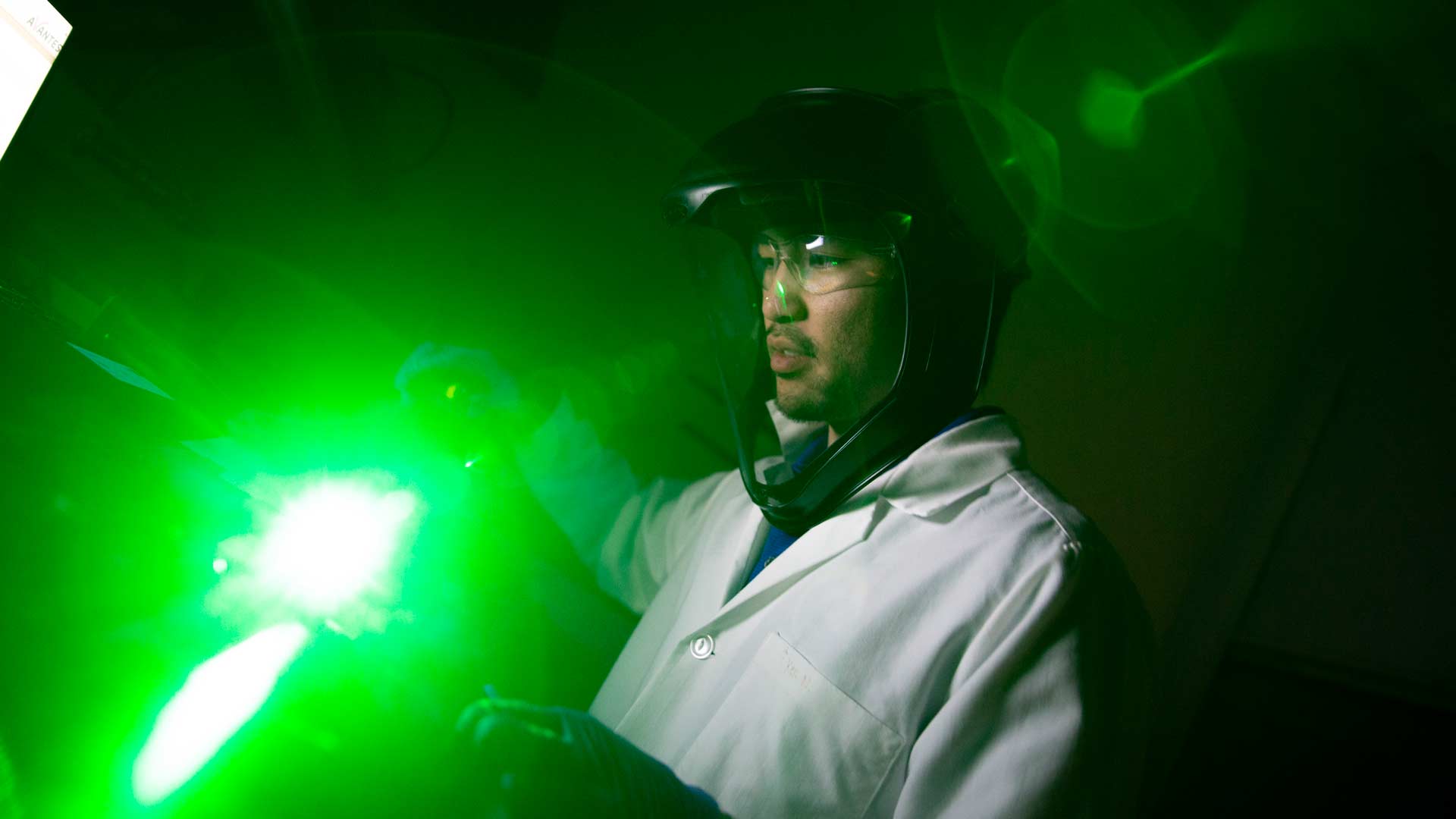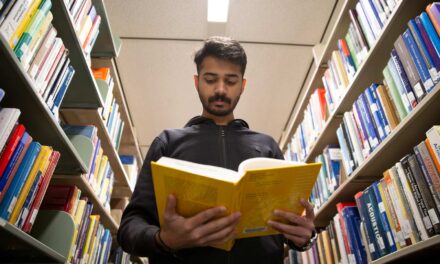
Bridging entrepreneurship and impact
ASU programs drive tech innovation in manufacturing, clean energy and environmental engineering

Arizona State University is playing a pivotal role in securing Arizona’s standing as the ideal setting for fast-growing, high-tech industries. Home to the Ira A. Fulton Schools of Engineering, the nation’s largest and most comprehensive engineering school, ASU is producing an increasing number of skilled and talented graduates who can help support the state’s growth in key sectors like manufacturing, clean energy and environmental engineering.
For years, the university has been involved in strategic efforts with academic, governmental and economic development leaders to diversify and spur economic growth in Arizona through research advancement, faculty hiring, industry engagement and workforce development.
Entrepreneurship has been another key factor in ASU’s mission to enhance its impact in the state. By cultivating entrepreneurial talent and connecting venture developers with the facilities to advance their work, Arizona can enjoy more job opportunities and rise to the forefront of technological innovation.
The New Economy Initiative, or NEI, Venture Challenge and the Science and Technology Center Entrepreneurial Fellowship program are two programs launched in recent years to provide ASU faculty and students with opportunities to earn support for their ASU-based spinout companies aligned with key areas identified as potential high-growth sectors in the state. Zachary Holman, the vice dean of research and innovation in the Fulton Schools, says success comes from elevating the community.
“We take responsibility for our place and for the communities that we serve,” Holman says. “The university’s culture is different from that of many other universities and that culture comes out through the way we educate and do research. Opportunities like the NEI Venture Challenge and STC Entrepreneurial Fellowships are giving faculty and students the resources and training to change the world.”
The NEI Venture Challenge, hosted by the J. Orin Edson Entrepreneurship + Innovation Institute, gives ASU faculty the chance to compete to win seed funding based on their startups’ technology readiness level, industry relevance and community impact.
For students, the STC Entrepreneurial Fellowship program is a channel for burgeoning founders to earn support as they advance their startups’ technology readiness level and work in Science and Technology Centers, referred to as STCs — ASU’s collaborative hubs research development and industry collaboration in areas like energy and advanced materials, manufacturing, human performance, extreme environments and advanced communications.
Michael Kozicki, a professor of electrical engineering in the School of Electrical, Computer and Energy Engineering, part of the Fulton Schools, became a Venture Challenge winner for his company, Densec ID, for its advancement in manufacturing processes. Kozicki and his team have created a stamping method that makes a unique mark on items during their manufacturing, “fingerprinting” them to ultimately prevent fraud and simplify authentication.
As a longtime faculty member, Kozicki appreciates the incentives ASU provides for faculty to explore entrepreneurship.
“There’s so much opportunity available here,” Kozicki says. “Between the freedom of thought and astonishing resources, if you can’t be entrepreneurial here, you can’t be entrepreneurial anywhere.”
Contributing to a brighter future
Solar energy is a major contender in Arizona’s energy industry. Zhengshan Yu, an assistant research professor in the School of Electrical, Computer and Engineering, an STC Entrepreneurial Fellow and co-founder of Beyond Silicon, says that while solar energy may seem pretty straightforward, the industry is constantly advancing.
“The solar industry is extremely competitive for improving panel efficiency because that’s the biggest cost driver,” Yu says. “In the past 15 years, panel efficiency has increased roughly 0.5% absolute per year, and silicon technology now has reached its theoretical efficiency limit. We are making add-ons to silicon cells to surpass the efficiency limit and keep the momentum to drive down the cost.”
Beyond Silicon is manufacturing a perovskite-silicon tandem solar cell that can be used as a drop-in replacement in today’s silicon panels. In 2018, the Beyond Silicon team set a world record for the efficiency of their perovskite-silicon tandem solar cell.
Providing a sustainable and efficient power supply to the community produces abundant benefits for the community, and ASU carries a vested interest in keeping talent local.
“NEI projects are really about creating jobs,” says Brent Sebold, director of the Entrepreneurship + Innovation program, also known as E+I @ Fulton. “We are creating roles for innovators at all levels, from entry to senior levels. NEI funds companies like Densec ID and Beyond Silicon where faculty and graduate students are co-founders. It creates opportunities to retain talented students who could have otherwise left Arizona.”
The E+I Venture Development team is actively working to curate programming and resources to work in tight collaboration between the Fulton Schools, SkySong Innovations and Corporate Engagement and Strategic Partnerships (CESP).
Tracy Lea, the Director of Venture Development at Edson E+I, says collaboration is the core of the program.
“E+I fuels the collaborations necessary to bridge gaps from research in vital industries represented by the STCs to commercialization that creates deep impact with tomorrow’s technologies,” Lea says. “We do this through our customer discovery in understanding the unique needs, challenges and opportunities of our talented faculty founders.”
Building new futures
In addition to seed funding for tech startups, ASU is also cultivating new prospects to advance manufacturing opportunities for future innovators.
Pu Han — an STC entrepreneurial fellow, a postdoctoral research scholar in the School of Manufacturing Systems and Networks, part of the Fulton Schools, and cofounder of Radiate 3D — is optimizing the polymer small-batch production industry. The company provides a 3D printing technology that can fundamentally improve the tooling and supply chain logistics of injection molding for the $10 billion polymer small-batch production industry.
Han’s 3D printing method uses radiation heating to optimize material interactions and produces quality comparable to those of injection molded products but at one-tenth the operational costs.
“We have a new technology headed to market that nobody else has,” Han says. “It applies to a broad range of industries that polymer small-batch production needs.”
Radiate 3D’s technology has the potential to drastically improve accessibility to prototyping and production tools for entrepreneurs, engineers and product designers to advance their work. The company plans to advance into developing and licensing IP and establish itself as a leader in the Arizona-based advanced manufacturing ecosystem.
Needs-based innovation
Paul Westerhoff, an ASU Regents Professor in the School of Sustainable Engineering and the Built Environment, is the chief technology officer and co-founder of H2Optics Insights. He and Kelly Westerhoff, the company’s president, won Venture Challenge seed funding for their development in fiber optics.
The technology involves fiber optic cables that emit UV light along its entire length, which kills biofilm that grows in narrow spaces such as home water or medical tubing and can be woven into meshes of many fibers to coat surfaces where biofilms can grow.
The core technology is being studied on the International Space Station and emerged from workshops and collaborations between NASA and the Nanotechnology Enabled Water Treatment Center, known as NEWT, where Westerhoff is the deputy director. He credits the company’s success to its fundamental understanding of its customers’ needs.
“Aspiring entrepreneurs must understand the true need behind their product, not just how their approach meets something,” Westerhoff says. “In the United States, over 13,000 people die per year because of microbes in medical catheters. In many applications, we saw that adding chemicals sometimes made things worse, so we adapted to use UV light as a non-chemical approach, focusing on innovations around light emitting diodes.”
Nicole Ray, an assistant research scientist in the ASU School of Molecular Sciences and founder of Rayn Innovations, is an STC Entrepreneurial Fellow focusing on sustainable practices. She is developing sustainable processing techniques by developing thin solar power-converting films for communication devices. Ray’s work uses nonhazardous chemicals, produces nonhazardous waste and has zero emissions due to its unique chemical process, which operates at 30% of the standard cost.
“We have unique technology and in the scientific field right now, a lot of focus is being made on zero emissions,” Ray says. “Managing hazardous waste is important for cost as well as protecting the safety of whoever is performing the experiments or manufacturing.”
Throughout her journey to advance her product’s technology readiness level, Ray has enjoyed moving out of her comfort zone.
“The one great thing I love about being an entrepreneur is learning fields other than the very niche work I studied in school,” Ray says. “Entrepreneurs tend to wear a lot of hats. They never stop learning and they don’t just take no for an answer; they pivot their technology and learn to communicate.”
Investing in local talent and fostering entrepreneurial activity is a catalyst for economic growth. ASU will continue to promote entrepreneurship from within to develop solutions and secure Arizona’s spot as a center for technological innovation.



































